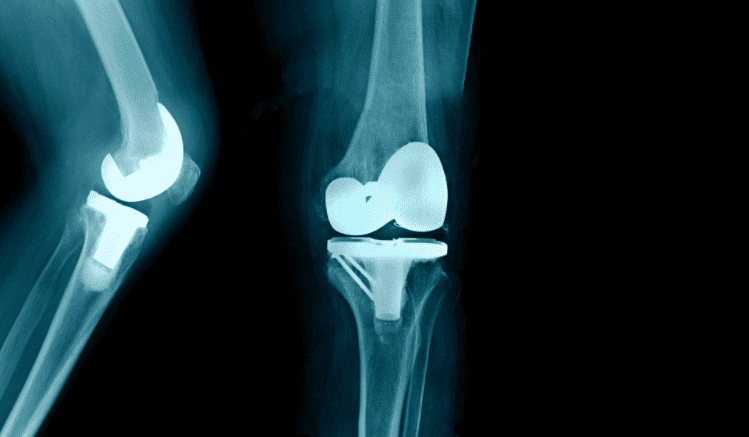After undergoing joint surgery, you may be wondering, can you run after knee replacement? While knee replacements can help improve mobility and reduce pain, the ability to run after the procedure varies from person to person. Factors such as age, overall health, and the condition of your replaced knee play crucial roles.
Running may be possible for you, but it often comes with limitations and potential discomfort. Stem cell therapy may offer a less invasive option with the potential for better long-term outcomes, potentially allowing you to return to running with fewer restrictions.
What is a Knee Replacement?
A knee replacement, also known as knee arthroplasty, is a surgical procedure where a damaged or severely arthritic knee joint is replaced with an artificial implant, typically made of metal and plastic. This procedure aims to relieve pain, improve mobility, and enhance the overall function of the knee joint.
If you’re experiencing chronic knee pain, stiffness, or reduced mobility due to conditions like osteoarthritis, rheumatoid arthritis, post-traumatic arthritis, or severe knee injuries, you should consider consulting an orthopedic specialist. They will assess your condition, medical history, and lifestyle to determine if a knee replacement is the right option for you.
However, the decision to undergo knee replacement surgery should be made in consultation with your healthcare provider, as it can come with some serious side effects.
Complications of Knee Replacements
When considering knee replacement surgery, it’s essential to be aware of potential complications that can arise. While the procedure can improve your quality of life, here are some complications you should know about:
Infection
Infections can occur in the surgical site or deep within the joint. Signs include redness, swelling, increased pain, and fever. Timely treatment with antibiotics is crucial.
Blood Clots
Surgery increases the risk of blood clots in your legs (deep vein thrombosis) or lungs (pulmonary embolism). Blood-thinning medications and movement are often prescribed to prevent this.
Implant Problems
The artificial knee joint may wear out over time, causing pain and instability. Revision surgery might be necessary.
Stiffness
Some individuals experience limited range of motion after surgery. Physical therapy can help address this issue.
Nerve or Blood Vessel Damage
Rarely, nerves or blood vessels around the knee can be injured during surgery.
Persistent Pain
Not all pain may be resolved, and some discomfort might persist.
Allergic Reactions
In rare cases, patients may have allergic reactions to implant materials.
Prosthetic Loosening
Over time, the artificial joint may loosen, requiring revision surgery.
Remember, the risk of complications can vary depending on individual factors, such as age, overall health, and adherence to post-operative care.

So, Can you Run After Knee Replacement?
In some cases, you may be able to resume running after knee replacement surgery, while in others, it may not be recommended.
Here are some considerations:
Individual Factors
Your age, overall health, and the condition of your replaced knee joint will play a significant role in determining if running is feasible. Younger, healthier individuals may have a better chance of resuming running.
Type of Knee Replacement
The type of knee replacement you received can impact your ability to run. Some implant designs may be more suitable for activities like running, while others may not withstand the impact as well.
Doctor's Recommendations
Your orthopedic surgeon is the best person to advise you on whether running is a safe option for you. They will consider your specific case, including your surgical outcome and healing progress.
Expectations and Goals
It's important to set realistic expectations. Running after knee replacement may not be the same as before, and you may need to modify your running style or distance.
Alternative Activities
If running is not recommended, your healthcare provider may suggest alternative low-impact activities like cycling, swimming, or walking to maintain your fitness level and joint health.
So while some individuals may be able to run after knee replacement, it’s not a one-size-fits-all answer. Consultation with your orthopedic surgeon and a thorough evaluation of your individual circumstances are essential to determine if running is a viable option for you.
If you dont think knee replacement is a good option for you, there are alternative options available that may be more effective in helping you heal.

Stem Cell Therapy, an Alternative to Knee Replacement
Unlike traditional knee replacement surgery, which involves replacing the joint with artificial implants, stem cell therapy utilizes your body’s own regenerative capabilities to heal damaged tissue in your knee.
Stem cell therapy offers several advantages over knee replacement:
Stem cell therapy is a minimally invasive procedure, reducing the risks associated with major surgery.
It harnesses your body's natural healing mechanisms, potentially promoting tissue repair and regeneration.
Recovery time is typically shorter compared to knee replacement surgery, with less pain and discomfort.
Unlike knee replacement, which involves removing parts of the natural joint, stem cell therapy aims to preserve the joint and potentially delay or avoid the need for surgery.
Ultimately, stem cell therapy offers a less invasive and potentially more natural approach to addressing knee joint pain and dysfunction, making it a valuable alternative to knee replacement.
The Science Behind Stem Cells for Knees
A meta analysis published in Medicine in 2020 revealed that stem cell therapy led to significant improvements in pain and knee function when compared to traditional treatments, with positive effects observed up to 24 months after treatment. Overall, the study suggested that stem cell therapy offers promise as a conservative treatment option for knee osteoarthritis, reducing pain without notable side effects.
Another 2022 study published in Regenerative Medicine investigated the real-world use of stem cell therapy for knee osteoarthritis in a large prospective case series. The study found that stem cell therapy can provide significant and lasting pain relief and improved knee function in individuals with knee osteoarthritis, regardless of their age or weight. This treatment may also help delay or even avoid the need for knee replacement surgery, offering potential benefits for both patients and the healthcare system.
Get in Touch with GIOSTAR Chicago Today to Learn More About Our Stem Cell Therapy for Knees
Discover a world of healing and hope with GIOSTAR Chicago’s advanced stem cell therapy. We empower our patients with comprehensive information, ensuring you understand the treatment process and its benefits. Our ultimate goal is to help restore your mobility and enhance your quality of life, helping you fully engage in daily activities.
Our team of experts is here to answer your questions and provide you with all the information you need. Your journey to pain relief and improved knee function begins with a simple message or call.
Contact us today by completing this form or calling us at 844 446 7827 to learn more about stem cell therapy and how it can help you finally alleviate your neck pain.
About GIOSTAR Chicago:
GIOSTAR Chicago is dedicated to developing the most advanced stem cell-based technologies and providing the best regenerative medicine for people who want to enjoy a healthy and active lifestyle.


